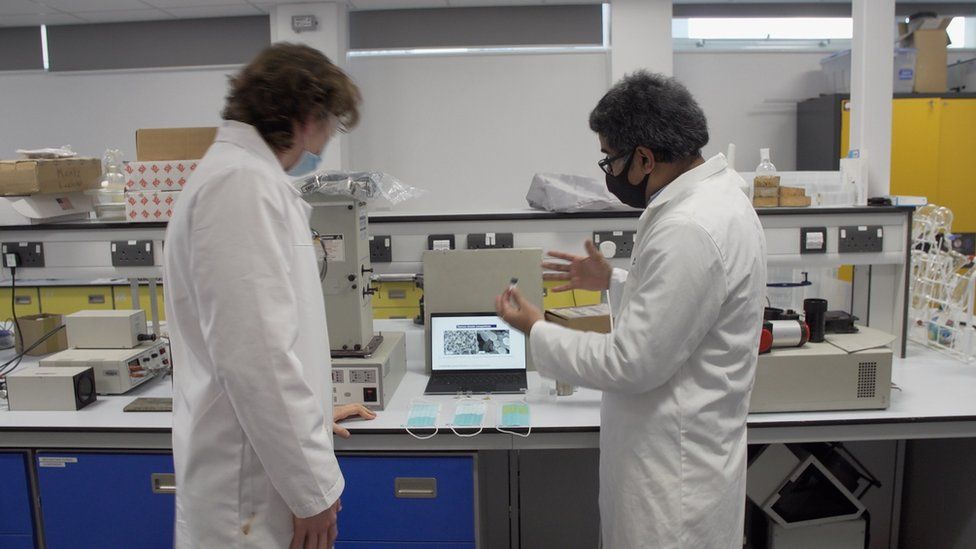Covid: PPE ‘could be recycled’ with help of sunlight
By Steffan Messenger
BBC Wales Environment Correspondent
Single-use Covid facemasks, plastic aprons and visors could be recycled into green fuel via a new technique developed by scientists.
The Swansea University-led team said it could help tackle a global problem of what to do with the pandemic’s medical waste.
Currently, old PPE is incinerated, which produces climate-warming carbon emissions.
This new approach uses sunlight to break the items down into hydrogen.
Researchers are also studying whether the process can kill off pathogens left on the PPE – including the Covid virus.

They say it could potentially save a lot of money for the NHS – with an estimated £700m a year spent disposing of hazardous medical waste across the UK, even before the pandemic struck.
Project lead Dr Moritz Kuehnel described facemasks littering roadsides as “just the tip of the iceberg if you think of the NHS and all those disposable aprons and gloves which have increased a lot because of Covid.
“Applying our technology to reprocess just 1% of this waste would save millions and mitigate pollution at the same time.”
Dr Kuehnel said finding a solution that was “cheap and easy to implement is really important”, especially for developing countries which may lack a good recycling infrastructure and incineration facilities.
Although the research is at an early stage, he said the hope was eventually to develop a low-cost device people could use.
“So you would have a simple, washing-machine kind of thing – put all your waste in, turn it on, wait for the sun to shine and then all the waste is gone but you also get something out that has a value.”
‘Huge environmental problem’
Lesley Jones, chief executive of Keep Wales Tidy, said discarded single-use PPE was becoming a huge environmental problem.
Data provided to BBC Wales by the charity suggested its volunteers had encountered PPE items on 45% of litter picks since September.
“That litter contains plastic which gets into our rivers and our marine environment, and the little strings that are on masks can cause real damage to birds and small wildlife like hedgehogs,” Ms Jones said.
“There’s also the danger to health for the people who are picking them up.
“Our message would be obviously please, please take your litter home with you or put it in a bin, but also to think really seriously about purchasing reusable masks as that is so much better for the environment.”
How can single-use PPE be recycled?
The research builds on the team’s previous work on generating hydrogen from waste plastics – a technique called photoreforming.
It involves using a photocatalyst – a material which absorbs light and can covert it into energy to promote chemical reactions – in this instance the breakdown of plastic waste and the conversion of water into hydrogen.
It also generates what are known as reactive oxygen species which can kill off germs.
The Swansea team, working with scientists in India, will help examine the photocatalysts’ antiviral activity against different pathogens, including the virus that causes Covid-19.
The Welsh Government has awarded £47,000 of grant funding to support the project.

